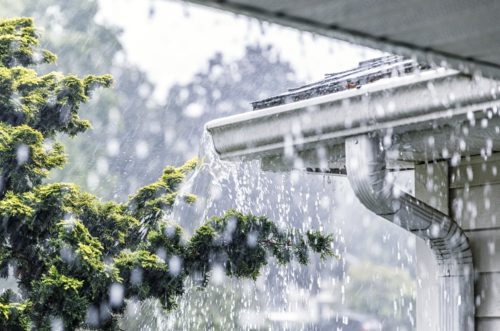
Tropical storms and hurricanes can cause heavy damage to your property during the summer and late fall. Storms not only bring down trees and cause flooding, but they can also wreak havoc on your heating and cooling system. It’s important to know how to prevent and check for HVAC storm damage so you know what steps to take if a major hurricane or tropical storm has hit your home.
Preventing HVAC Storm Damage
Use these six steps to protect your HVAC system and prevent damage.
1. Move All Electrical Appliances, Heaters, and Fans Away From the Air Handlers
Doing this will reduce the risk of power surges or blown electrical components should there be a lightning strike.
2. Wrap the Outdoor Units
Use a tarp and secure it with clips or rope to wrap the outdoor units before a storm. This may not cover the entire system, but it can prevent debris or water from entering the system and preventing damage.
3. Check Carbon Monoxide Levels Before and After Storms
In addition to checking for gas leaks following storms, make sure that you test CO levels inside your home. Methane gas is typically used in systems and generators, so it may be easy to detect if levels are too high. If your carbon monoxide levels are elevated, call in a certified HVAC technician to check the system for any problems.
4. Turn Off All Electric Devices
When a storm rolls through, make sure to turn off all electrical devices plugged into the same circuit as the air handler unit. This will include anything from televisions and lights to appliances and motors.
5. Use Fans Instead of AC or Heaters
Instead of using your central air conditioner or heater, use fans to circulate air through each room. This will prevent the heat or air conditioning from being struck by lightning during a storm, potentially damaging the system.
6. Turn Off Your Furnace and HVAC Unit if You Do Not Have Continuous Power for Several Days
When you’re without power for several days, your furnace and HVAC system can still use up gas and create a safety hazard. Turning off your furnace and HVAC unit will prevent this from happening.
Checking for HVAC Storm Damage
When checking for storm damage, notice these five issues:
1. Is the Basement Flooded?
If so, that means that your furnace and HVAC unit may not be working properly and will need to be cleaned out by a technician. Call in a plumber to remove the water from the basement. You can also check for mold growth on the walls if it has flooded your basement, which will likely cause health issues for you or your family.
2. Are the Clothes Dryer Vents Blocked With Lint or Debris?
If your clothes dryer is running, it means that the vent is blocked. If you see any of this, call our Controlled Climate Service HVAC technician to check it out.
3. Are There Home Appliances and Heating Equipment That Have Been Damaged?
When checking for storm damage, look at each room to see if a fallen branch or other debris has damaged anything during the storm. If so, you will need to call in an HVAC technician to check on it.
4. Is There Water Damage Inside the Home?
If so, that means that your furnace and HVAC unit may be clogged with sediment or water damage. If you see damp spots in any of your rooms, call in an HVAC technician to take care of them.
5. Are There Signs of Mold on Walls or Around Air Ducts?
If so, you will need to call in a plumber and an HVAC technician immediately. If left untreated, mold can cause serious health issues for you and your family.
What to Do After a Storm
Once the storm has passed, remove the tarp on your condenser unit to prevent any further damage. Leaving a tarp over the unit for several days can trap moisture, leading to mildew, mold, or rust. You need to call an HVAC technician to inspect the outdoor unit and clear away leaves and dirt before you turn on the air conditioning system.
Strong storms, such as hurricanes and tornadoes, can cause significant property damage to your home and outdoor AC unit. At Controlled Climate Services, we are committed to providing quality HVAC services. We also offer indoor air quality solutions.
Contact Controlled Climate Services in Kennesaw, GA, today for more information or to schedule an appointment. We serve Kennesaw and the surrounding areas.
